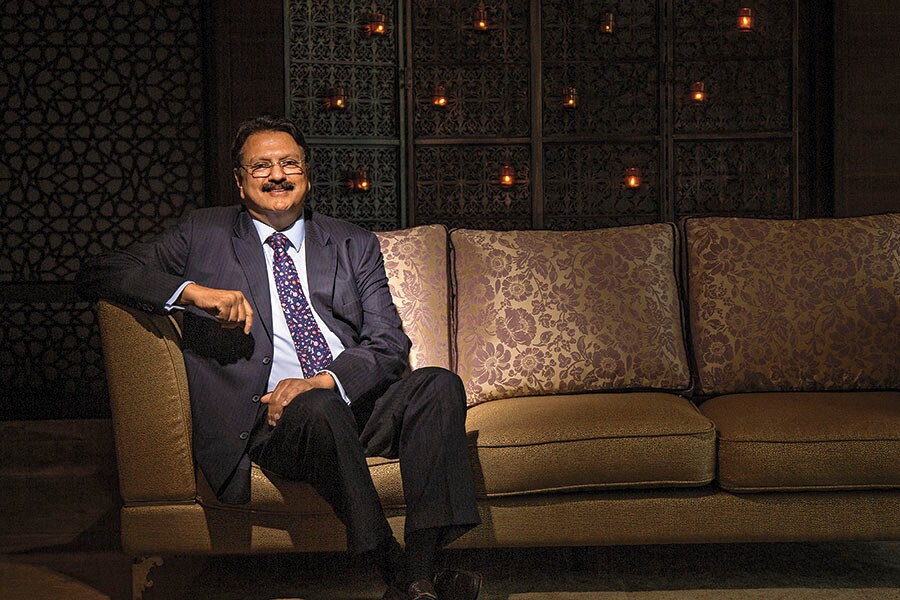Piramal making health care count, again, with a $171 million acquisition
Mallinckrodt portfolio acquisition seventh in two years for Piramal Enterprises Limited; OTC division registering strong growth


 Ajay Piramal, chairman of Piramal Group, invariably chooses the path less travelled
Ajay Piramal, chairman of Piramal Group, invariably chooses the path less travelled
Image: Joshua Navalkar
The Piramal Group this week has taken one more step to consolidate its health care business with a $171million acquisition, wherein wholly owned subsidiary Piramal Critical Care will buy out a portfolio of drugs from UK-based Mallinckrodt LLC.
This acquisition, which includes spasticity management drug Gablofen (currently marketed in the US), and two pain management products currently under development, will help the Piramal firm diversify their US market offerings by being able to tap into the niche segment of Intrathecal drugs.
The Critical Care subsidiary, which is a part of the Piramal Healthcare business vertical, is a part of Piramal Enterprises Limited (PEL), the group’s flagship and listed company. Other subsidiaries are Pharma Solutions and Consumer Products (OTC).
Piramal is confident that as all the three divisions grow, the listing of pharmaceuticals and financial services as separate businesses will take place in the future.
Health care was always at the core of business at the Piramal group. But, since 2010, after the sale of Piramal Healthcare’s generic drug business for $3.72 billion to Abbott Laboratories, financial services and real estate businesses, have, in the public eye, been seen as strong engines of growth for the group.
Healthcare contributes 47 percent, financial services 39 percent and information management 14 percent to the revenues of PEL. The contribution of health care to overall revenues has, however, fallen in recent decades from 80 percent in FY2011 to 47 percent in FY2016.
“Somehow the financial services business gets more mindspace,” Ajay Piramal, chairman of the Piramal Group, tells Forbes India. But he maintains that, post Abbott, the group has “built and almost re-created” the health care businesses. The latest acquisition, announced on January 30, was PEL’s seventh acquisition in the past two years and took its investment for inorganic growth to Rs 3,000 crore across the pharmaceuticals sector.
Pharma revenues have been growing at 17 percent CAGR over the past five years to Rs 3,558 crore in FY2016 from Rs 1,604 crore in FY2011.
The strategy for health care, according to Piramal, is simple: To move up the value chain. “We will concentrate more on products than services,” he said. This is because they offered higher margins and greater sustainability to the business.
In the case of the Mallinckrodt portfolio, Piramal says, “Our strategy is to get into differentiated products which are either difficult to manufacture or distribute.” This is exactly what Gablofen offers: A branded, generic drug with limited completion.
“Along with our Inhalation Anesthesia products, we are building an exciting portfolio to offer our customers and a substantially more diversified revenue base,” Peter de Young, CEO of Piramal Critical Care, said.
The Mallinckrodt acquired portfolio will add substantially to the Critical Care topline. In the 12 months to September 2016, revenues from the portfolio were $44.6 million.
Piramal said all the three pharma divisions will continue to grow through the combination of inorganic and organic route. “We will invest in acquisitions and also grow the business, strengthen sales and distribution.”
In October 2016, the Critical Care subsidiary had acquired five anesthesia and pain management injectable products from Janssen Pharmaceutica NV, in an all-cash deal for $155 million.
Piramal also expanded on the growth strategy for their OTC business, which is headed by his daughter Nandini. The OTC business has made three large acquisitions in the past 18 months, which included four brands from Pfizer ltd five brands from global drug brand Merck (known as MSD outside US and Canada) and baby care brand Little’s.
“In our OTC business, six of our brands are in the top 100 OTC brands,” Piramal added. The OTC company is among India’s top five of its type, growing by 18 percent seven years revenue CAGR. The OTC business through its brands has expanded to over 400,000 total outlets in 1,500 towns and a field force of 2,000, compared to 24,000 outlets in 16 towns and only 80 staff in FY2008.
Piramal maintains that the health care and financial services businesses within PEL will be demerged. “The accounts will become separated and there will be greater transparency for shareholders and investors.”
First Published: Feb 02, 2017, 09:50
Subscribe Now